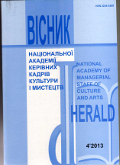Ideal concept: experience scientific understanding
DOI:
https://doi.org/10.32461/2226-3209.4.2013.138041Keywords:
ideal world, ideal typology, philosophical anthropology, etnokulturolohiya, cultural knowledge, philosophy, interdisciplinary approachAbstract
The article analyzes the dynamics of scientific understanding of the concept of the ideal, reasonably future directions of its development and revealed heuristic possibilities of methodological strategies of cultural knowledge that can integrate various scientific discourses. It is shown that the ideal as a special work culture is one of those phenomena, the first ideological and methodological approaches to the understanding of which are outlined in the writings of philosophers of Antiquity, the Middle Ages and the Renaissance. In Soviet philosophy of the Enlightenment ideal concept closely associated with anthropological themes , initiated in practical philosophy G. Skovorody, kardiosofiyi P. Yurkevich, moralvalue "philosophy Heart" M. Berdyaev . At different historical nuances of the twentieth century multiplicity of approaches have been developed in the interpretation of the concept of the ideal, though his general theory developed in this period, mostly within a dominant ideology . In 1920-he formed the ideal concept of categorical field as philosophy and sociology and psychology. At this time, it was a philosophical anthropology methodological paradigm of philosophical thought and the subject matter for the evolution of cultural theories. Already in the 30-60-ies of XX century idea of the ideal of completely based on MarxistLeninist ideology, the original theoretical and methodological approach, which was his interpretation of the phenomenon of consciousness – social and individual . In the 1970's weighty theoretical study of the problem has become the ideal in the writings of one of the greatest philosophers of the second half of the twentieth century – E. Ilyenkova and philosophical reflection of the Kiev school of philosophy – V. Shynkaruk with A. Yatsenko .Downloads
Published
Issue
Section
License
Authors who publish with this journal agree to the following terms:
1. Authors retain copyright and grant the journal right of first publication with the work simultaneously licensed under a Creative Commons Attribution License International CC-BY that allows others to share the work with an acknowledgement of the work's authorship and initial publication in this journal.
2. Authors are able to enter into separate, additional contractual arrangements for the non-exclusive distribution of the journal's published version of the work (e.g., post it to an institutional repository or publish it in a book), with an acknowledgement of its initial publication in this journal.
3. Authors are permitted and encouraged to post their work online (e.g., in institutional repositories or on their website) prior to and during the submission process, as it can lead to productive exchanges, as well as earlier and greater citation of published work (See The Effect of Open Access).


